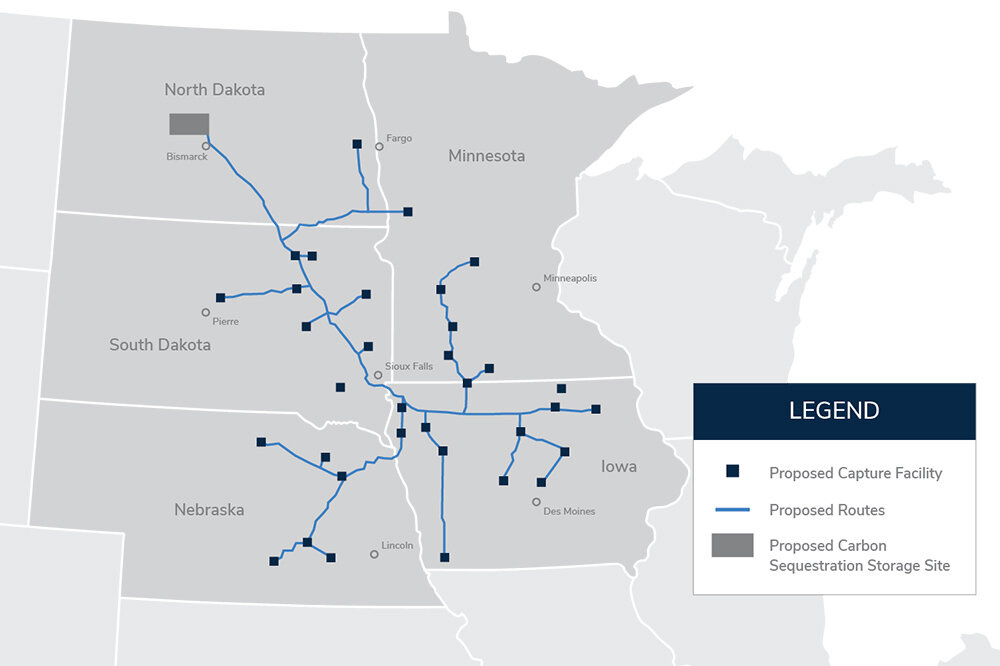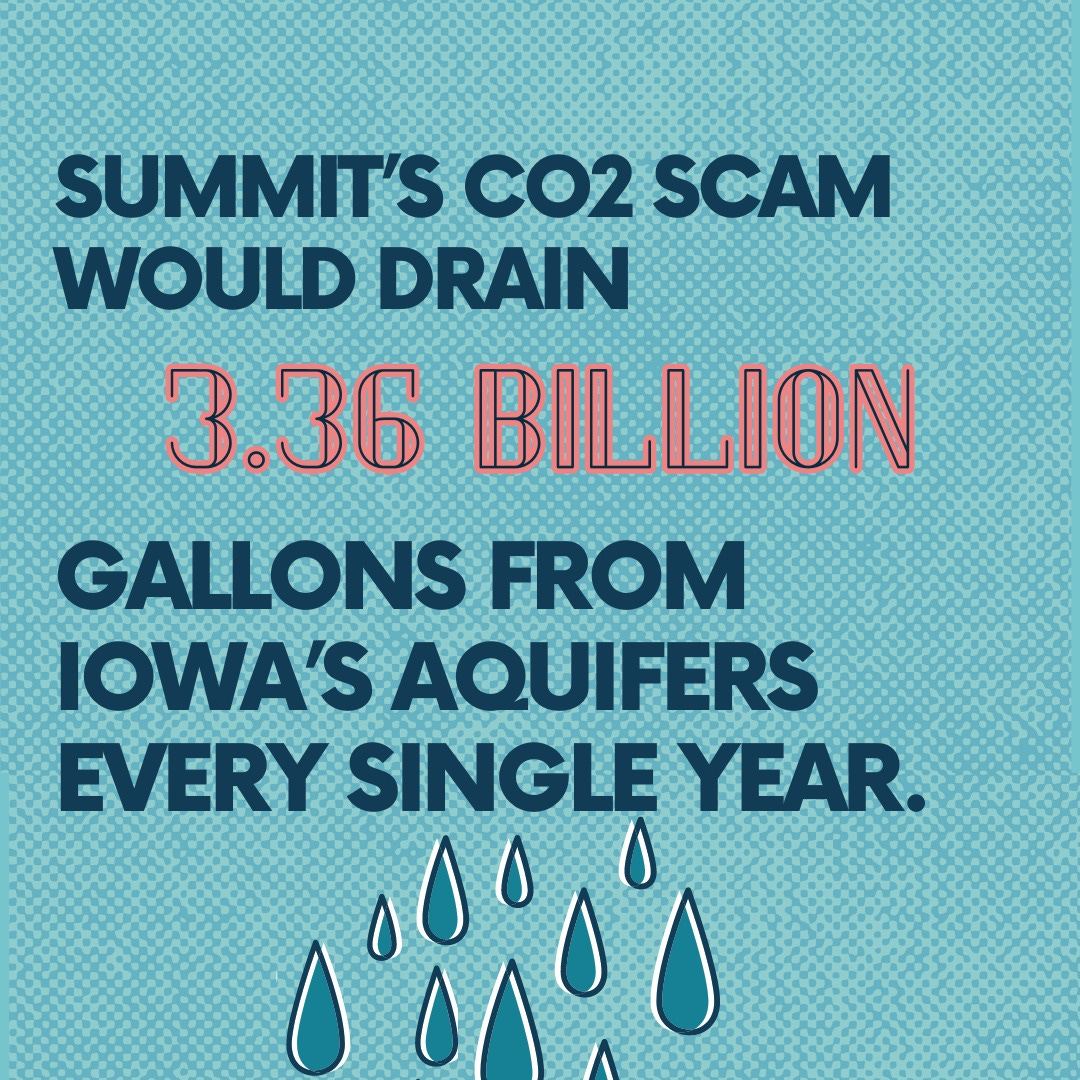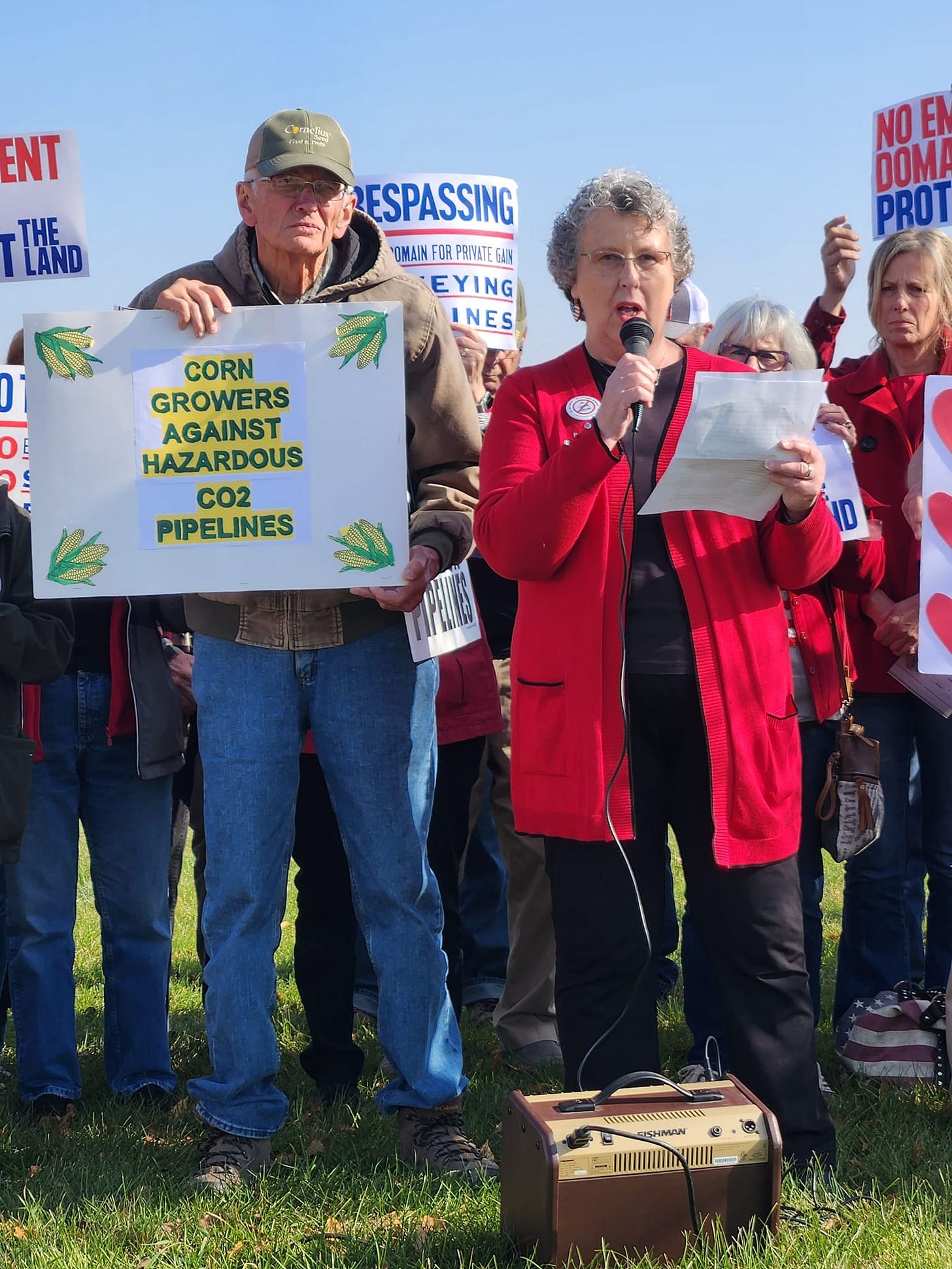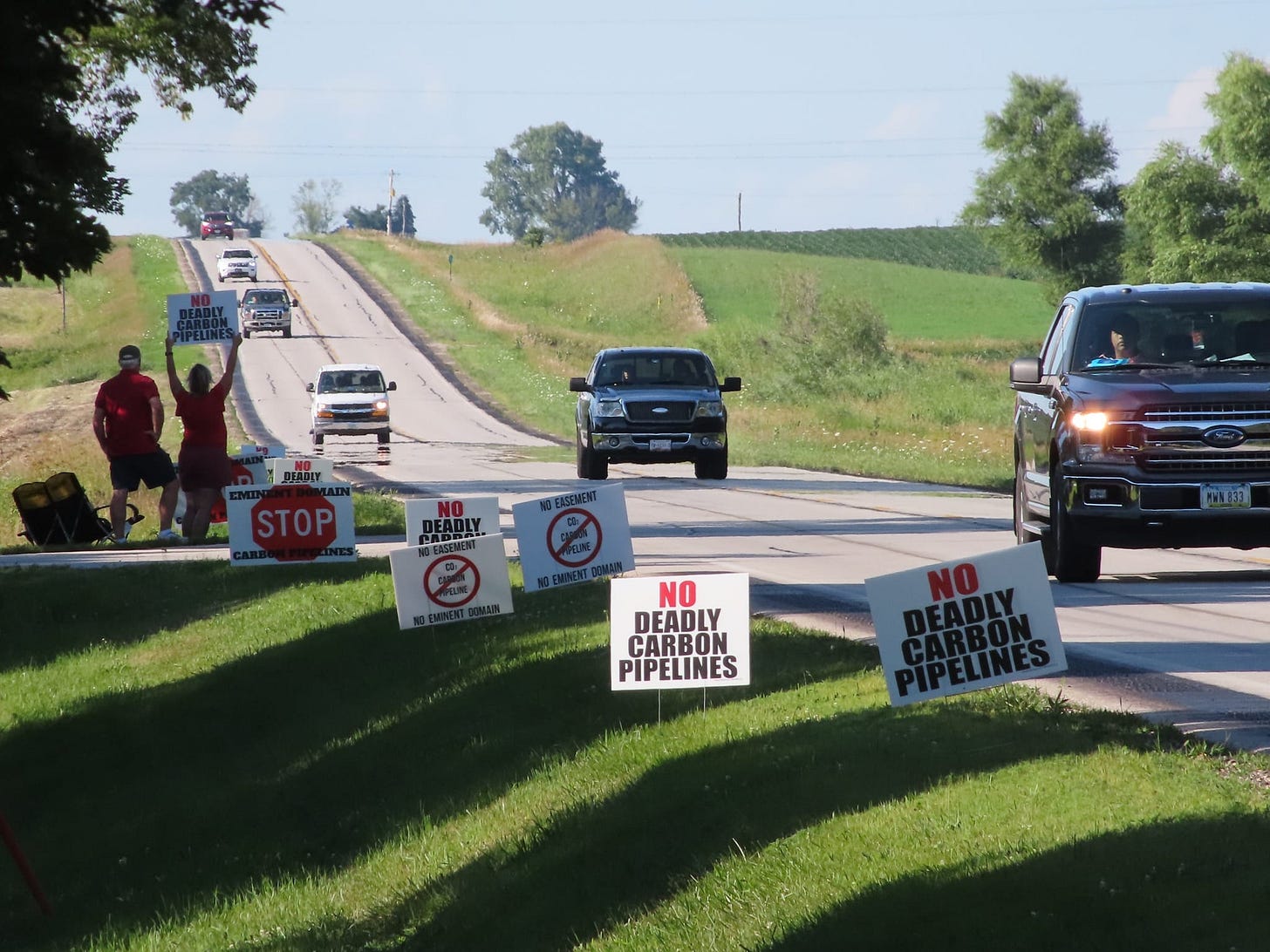A battle is underway in five Midwest states over construction of carbon dioxide (CO2) pipelines as part of the “green energy” transition. Opposition to wide-area pipeline networks is rising from all walks of life. In addition to impacted property owners, community members are becoming increasingly concerned about the pipeline’s safety, the lack of transparency from the state and the speed of which this project is being “ramrodded” onto the people.
Furthermore, an increasingly amount of citizens are coming forward in protest over the fact that the utilities and state governments are intending to seize private land on behalf of Summit Carbon Solutions, a new company that has never built a pipeline.
“I work for the Sierra Club Iowa chapter, and for the last three years, we have been working to stop these pipelines," Conservation Coordinator for the Iowa Chapter of the Sierra Club Jess Mazour said. "We found out about it probably in July of 2020 when Iowa created the Carbon Sequestration Task Force. And we're like, what is that?"
Despite the growing number of protests against the pipeline project, on June 25, the Iowa Utilities Board (IUB) granted the petition of Summit Carbon Solutions (Summit) for a permit to build a CO2 pipeline across Iowa. The IUB determined that the pipeline was for “public use”, and granted Summit the right to seize land from Iowa landowners using eminent domain.
Eminent domain has typically been used to take private land for government projects that serve a public good, but generally not for private industry.
“In the beginning, we had 10 people who were very concerned and opposed and that quickly grew to 20 to 25 to 40, now we have thousands of landowners who are opposed and hundreds of those landowners have hired the same attorney,” Mazour said. “We've been going through the last three years fighting it. And now Summit has announced a phase two expansion.”

Summit plans to build pipelines across Iowa, Minnesota, Nebraska, North Dakota, and South Dakota to transport captured CO2 to deep underground storage sites in North Dakota. The cost of the 2,500-mile project is about $5.5 billion.
Summit seeks billions of dollars from the federal government. If the pipeline network becomes operational, the company will receive up to $85 per metric ton in tax credits under Section 45Q of the Internal Revenue Code.
Summit claims they will sequester up to 18 million tons of CO2 each year, which equates to annual tax credits of over $1.5 billion. Summit claims to have signed agreements with over 2,700 landowners to build the pipeline.
“We're also really concerned about the land destruction. We've never had a pipeline of that magnitude come into Iowa until Dakota Access and we learned a lot,” Mazour said. “Our soil is what makes Iowa a great agricultural state.”
Ethanol producers in the five states are interested in participating in the project. Captured CO2 from 57 ethanol plants would be sold to Summit, providing a revenue stream for producers.

Billions in federal funds may also be available to ethanol plants that capture CO2. In addition, reducing CO2 emissions may allow ethanol producers to qualify their product as “Sustainable Aviation Fuel” for commercial airlines.
Supporters of Summit claim the project will deliver environmental benefits in the fight against climate change. Summit says the annual CO2 emissions savings will be equal to removing 3.9 million vehicles from our roads. But past carbon capture and sequestration project do not support Summit’s carbon claims, marketing hype or projected information.
The project is full of cost issues, environmental hazards and safety problems.
For example, the feasibility and cost track record of CO2 capture is poor. There are 47 major carbon dioxide capture and storage (CCS) plants operating in the world today, and most are money pits even with heavy subsidies.
Even with multiple layers of government subsidies, tax credits and economic stimuluses, ethanol plants that pursue CCS will likely lose money, along with the taxpayers who provide the taxpayer subsidies and direct carbon cash.
For example, the Quest CCS project operated by Shell in Alberta, Canada captures only 35% of the CO2 emitted from a chemical process to upgrade bitumen from oil sands. The capital cost of the project is $811 million, entirely paid for with $865 million in grants from the Canadian and Alberta governments. The Quest CCS operation will cost $41 million a year to run with only $27 million per year offset in payments from carbon credit subsidies.
In addition to the billions in green energy subsidies, the environmental benefits from the Summit project will be tiny. CO2 captured from Midwest ethanol plants will do little to affect global temperatures. Today, all of the world’s operating CCS facilities capture only 0.1% of industrial emissions.
CO2 pipelines are not like natural gas or crude oil pipelines and come with huge safety issues. Only about 5,000 miles of CO2 pipelines exist in the U.S., compared to 84,000 miles of crude oil pipelines and three million miles for natural gas.
Most CO2 pipelines transport liquified CO2 short distances to oil fields where it is pumped underground to force oil and gas to the surface. CO2 in pipelines is a liquid under high pressure. If it leaks, it turns to gas as it rushes out.
Since it is heavier than air, it stays close to the ground and can cover wide areas. CO2 is harmless in small quantities, but in large amounts, it is an asphyxiate, can force oxygen out of people’s lungs, and can cause headaches, dizziness, serious injuries, and death.
On February 22, 2020, a CO2 pipeline ruptured in Sartaria, Mississippi. The rupture occurred on a Saturday and spewed CO2 for about four hours. An invisible cloud of CO2 moved through the rural community forcing more than 200 people to evacuate and at least 45 to be hospitalized. Victims were unable to breathe and suffered unconsciousness and fits of shaking. No one died during the incident, but some victims continue to suffer ongoing physical problems.

Furthermore, there is the issue of water and carbonic acid. Carbonic acid is an unstable acid with the chemical formula H₂CO₃ that is formed when carbon dioxide dissolves in water.
“Summit's 31 ethanol plants in Iowa will need 3.36 billion gallons of water annually just for the CCS equipment,” Mazour said. “If you add the CCS equipment water needs with those 31 ethanol plants water needs just to make the ethanol, it's 13.5 billion gallons of water annually.”
Mazour continued with the water issues in that this water is coming from deep bedrock aquifers, and the water down there is thousands and thousands of years old.
“It does not recharge quickly with rain,” Mazour said. “It will not recharge in our lifetimes if we drain it.”
Proponents and opponents battle in state legislatures and at public utility meetings while the state and Summit continue to ignore the people and advance the private project. Counties in all five states have recently passed bans or restrictions on CO2 pipelines.
North Dakota regulators denied Summit’s application last August but have agreed to reconsider. Last month, Illinois, who have their own pipeline project concerns, also passed a bill putting CO2 pipeline construction on hold until 2026.
South Dakota regulators denied Summit’s application last September, but the legislature passed a package of regulations earlier this year that may aid approval of the pipeline network. South Dakota voters will have an opportunity to reject that package of regulations on this year’s November 5 ballot.
The Summit pipeline project would not exist without large amounts of federal subsidies for CCS. These enormous subsidies, driven by the fear of human-caused global warming, appears to be the only reason companies are attempting to seize land from farmers and property owners in the Summit project.
Even if this huge pipeline system is built and CO2 is captured at 57 ethanol plants, the effect on global emissions will be insignificant and the effect on global temperatures will not be measurable.
Land for pipelines is not the only case where land is being seized to promote green energy.
The US Department of Energy recently announced plans to use eminent domain to seize land across wide areas to build transmission towers for new wind and solar systems. Illinois and Michigan passed laws blocking restrictions and outright bans by local communities on deployment of wind and solar systems. Governments and investors of Summit Carbon Solutions consider the fight against human-caused climate change more important than the property rights of citizens.
“We are struggling to get any transparency, whether it's from Summit or from our elected officials," Mazour said. "We want to know who the investors are, plain and simple, because then we know who should be recusing themselves, who we should be trusting and who we should not trust.”
Mazour continued explaining and citing examples of transparency issues.
“Our governor, Kim Reynolds, who appears to be doing the bidding for Summit, and we definitely have tracked some campaign contributions from Bruce Rastetter to the governor and other elected officials in the state,” Mazour said. “But we also have the governor who's appointing members to our Iowa Utilities Commission, and we have a Senate that won't pass our bills. So we need a lot of transparency from our elected officials, but also from Summit.”
According to Mazour, the IUC is a three-member board who is appointed by the Governor. About a year into the Summit process, one of the members retired, and they replaced him and that new person took over as chair.

“And so the person who was chair was mad and resigned,” Mazour said. “We had two new appointments midway through the process that Governor Reynolds got to pick and just the whole process of how it happened just screamed corruption because they removed the acting chair to put in a brand new person who was very questionable.”
Mazour simply summed up what she has been hearing from property owners, communities and many walks of life.
“It's been a travesty to see our elected leaders and our appointed leaders put these pipelines and their big money ahead of the people, our safety and our communities,” Mazour said. “In fact, former Iowa Governor Terry Branstad works for Summit as one of the strategic advisors for Summit.”
Mazour said there are more public meetings scheduled this week in Iowa as there is an increasing demand for collaboration, transparency and awareness. In addition to the issues of eminent domain, water contamination and general community safety, one of the biggest problems is the “ruthless” behavior from Summit Carbon Solutions.
“They're doing lots of ruthless things all across the state,” Mazour said. “But we're making sure people know exactly what they can do to plug in and not just sit on the sidelines watching it.”
Upcoming public information meetings in Iowa: Hardin and Hamilton County on August 12th, Floyd, Mitchell, and Worth counties on the 13th and Palo Alto, Clay County on the 20th.
For more information, Mazour can be contacted by email at Jessica.mazour@sierraclub.org
STEAM FOOTBALL AND MORE ON PARAMOUNT+
Football, football and... more football! Check out what's coming up this fall on Paramount+:
National Football League (NFL) on CBS
Stream your local game live every week! Plus, catch national games on CBS, including the postseason, and watch along with Jim Nantz, Tony Romo, Tracy Wolfson and the best broadcast team in the business.
UEFA Champions League
Follow along with the biggest club competition in the world and stream every UCL match live! Don't forget to catch the best pre-, half- and post-match show: UCL Today.
Big Ten Conference Football on CBS
Cheer on your favorite schools and stream Big Ten Football on CBS live with the Paramount+ with SHOWTIME plan! Catch some of the biggest programs like University of Michigan, The Ohio State University, University of Iowa, Penn State University and more facing off on the gridiron.
Stream these sports and so much more on Paramount+. Try it FREE!



















Share this post